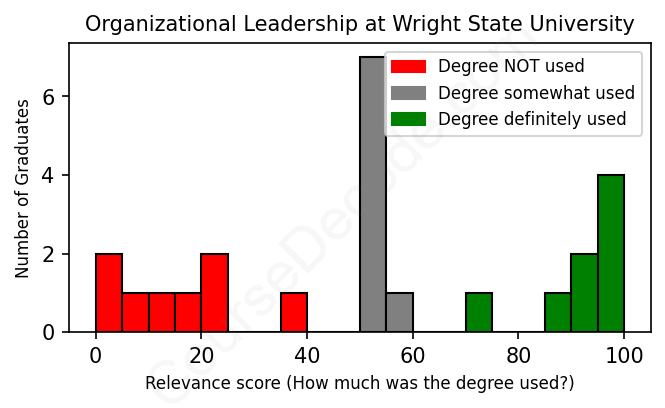
First, some facts. Of the Organizational Leadership graduates from Wright State University we've analyzed , here's how many have used (or NOT used) their degree in their career:

These are estimates based on AI analysis of 24 LinkedIn profiles (see below).
The verdict? Significantly below average. Overall, with an average relevance score of 52%, Organizational Leadership graduates from Wright State University have a much lower likelihood (-15%) of finding work in this field compared to the average graduate across all fields:
And for comparison, here's the chart for all profiles we've looked at across all degrees.
Also, after graduating, only 16% of these graduates have pursued further education other than another Bachelor's degree (such as a Masters degree or other), compared to the average across all profiles of 35%. This suggests a Bachelors degree is enough for most Organizational Leadership graduates, and it's normal to look for work straight after graduation.
See the details:
|
Relevance score: 50% We think this person has gone into a career only somewhat relevant to their degree. We think this person has gone into a career only somewhat relevant to their degree.
DEGREE INFOGraduated in 2011 from Wright State University with a Bachelor's degree in Organizational Leadership. No other secondary education since. JOB HISTORY SINCE GRADUATIONAccount Executive UPS Sep 2019 - Present ABOUTI am a Business Development Account Executive with UPS. I have previous experience as a UPS supervisor in safety and operations with a demonstrated history of working in the logistics and supply chain industry. Skilled in customer service, management, Microsoft applications, negotiating, and communications. I am a business and operations professional with a Bachelor's degree focused in Organizational Leadership from Wright State University as well as a minor in Criminal Justice. Experience in the criminal and law field as well. |
The top 10 most common jobs done by the graduates we've analyzed (ranked most common to least) are:
After looking through a bunch of LinkedIn profiles of folks who studied Organizational Leadership at Wright State University, it seems like a lot of them ended up in jobs related to management and program coordination. A good chunk of these positions, like Program Managers at the U.S. Air Force or Operations Supervisors at Alro Steel, do have some elements of leadership involved, but many seem to be more focused on specific technical or operational tasks rather than the broader leadership concepts you might expect from an Organizational Leadership degree. For example, while the roles at the Air Force deal with important operational aspects, they don’t really pull from the leadership strategies that are a big part of the curriculum.
On the other hand, there are also profiles where graduates took roles like Public Affairs Specialist or Non-Profit Retail Manager, where they really use the skills directly tied to Organizational Leadership—like working with teams and planning events. So, it’s a mixed bag! Some grads are finding their degrees aligning nicely with their jobs, while others are in positions where the connection isn’t quite as strong. Overall, if you were to call it, many of these jobs aren’t using those organizational leadership skills every day, but there are definitely some exceptions where the degree is being put to good use!
Here is a visual representation of the most common words in job titles for Organizational Leadership graduates (this is across all Organizational Leadership graduates we've analyzed, not just those who went to Wright State University):

The graduates from Wright State University's Organizational Leadership program seem to have quite a mix of career trajectories, but overall, many appear to be successfully landing roles that fit their degree's focus. Right after graduation, numerous individuals often start in entry-level positions relevant to their field of study, working in supportive roles like project coordinators, account executives, or customer service specialists. They seem to be taking the foundational skills they've gained in leadership and communication into various sectors, including government, healthcare, and business operations.
Fast forward five to ten years later, and it's clear many graduates have moved into more advanced positions. For example, those who entered the Air Force or federal agencies often climb the ranks into program managers or specialists, which speaks to their capability in leadership roles. Even in the private sector, like banking or marketing, many have transitioned to managerial roles, suggesting that the degree prepares them well for significant responsibility. While a few individuals might have taken more unconventional paths, such as working in non-profits or customer service roles, it seems many are finding their way into careers that are not just stable but also aligned with the principles of organizational leadership. Overall, it appears that earning a degree in Organizational Leadership from Wright State sets graduates up for worthwhile career paths.
Honestly, the Bachelor’s degree in Organizational Leadership at Wright State University, like many similar programs, tends to strike a balance between being manageable and challenging. It's designed to be accessible for students with different backgrounds, so you might find the coursework pretty relatable and engaging. Expect to dive into topics like team dynamics, decision-making, and effective communication, which can be interesting and applicable to real-life situations. While some parts can be a bit tricky, especially if you're not used to group projects or presentations, many students find it isn't overly rigorous compared to other fields like engineering or the sciences. Overall, it's a program that you can handle with a good amount of effort and time management!
Most commonly, in the LinkedIn profiles we've looked at, it takes people 4 years to finish a Bachelor degree in Organizational Leadership.
Looking at the jobs held by these Wright State University Organizational Leadership grads, it's pretty clear that many of them have landed decent-paying positions, especially those working with the U.S. Air Force and at major companies like UPS and Bank of America. The folks with roles like Program Managers and HR Specialists generally make good money, likely well above average for their regions, considering the level of responsibility involved. On the other hand, some of the earlier career moves, like working in retail or as a server, might not be raking in the bucks as much. Overall, it seems like most of these grads have been able to build up their careers to a point where they're probably doing alright financially.
Here is a visual representation of the most common words seen in the "about" section of LinkedIn profiles who have a Bachelor degree in Organizational Leadership (this is across all Organizational Leadership graduates we've analyzed, not just those who went to Wright State University). This may or may not be useful:

Here are all colleges offering a Bachelor degree in Organizational Leadership (ordered by the average relevance score of their Organizational Leadership graduates, best to worst) where we have analyzed at least 10 of their graduates:
| College | Score | Count |
|---|---|---|
 Texas A&M University-Commerce Texas A&M University-Commerce
|
74 | 16 |
 Arizona State University Arizona State University
|
72 | 23 |
 University of Louisville University of Louisville
|
69 | 10 |
 Purdue University Purdue University
|
67 | 12 |
 University of Charleston University of Charleston
|
67 | 17 |
 University of Cincinnati University of Cincinnati
|
66 | 13 |
 Trident University International Trident University International
|
65 | 10 |
 South Texas College South Texas College
|
65 | 11 |
 Southern Nazarene University Southern Nazarene University
|
63 | 15 |
 Ashford University Ashford University
|
58 | 20 |
 Azusa Pacific University Azusa Pacific University
|
58 | 11 |
 Northern Kentucky University Northern Kentucky University
|
57 | 25 |
 Wright State University Wright State University
|
52 | 24 |